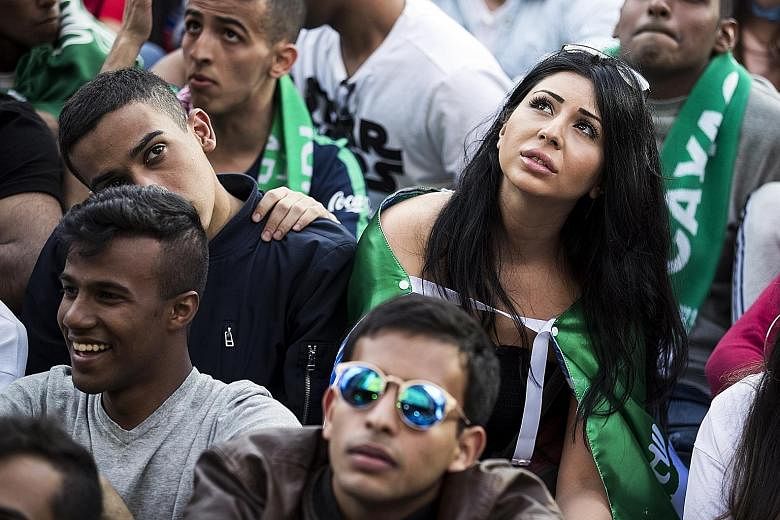MOSCOW • Saudi Arabia may have been thrashed in their opening World Cup match, but Saudi women attending the tournament said they still had lots to celebrate after a ban on them attending matches at home was lifted earlier this year.
Yakir Zaki was one of many fans who had no illusions about her team's performance last Thursday when they suffered a 5-0 drubbing at the hands of hosts Russia.
"They didn't play well. They were lost in the game. They didn't know what to do," she told Reuters.
But, for the 35-year-old and other female Saudi football fans, the sport has come to symbolise far more than just winning.
"As a teenager and a kid, I used to be a huge football fan," said Zaki, who is at the World Cup with her two daughters and niece, as well as her husband and brother-in-law.
"It was one of my dreams to attend a game in a stadium. For my kids, my daughters to have the opportunity to do that, it's amazing."
A ban on women attending football matches in the deeply conservative Muslim kingdom was lifted in January as part of a wider relaxation of social restrictions championed by Crown Prince Mohammad bin Salman.
Zaki said she had been to five matches in Saudi Arabia since then and that the Russia match was her first abroad.
In the build-up to the opening game, small parties of Saudi women marched through the crowds towards the Luzhniki Stadium.
"It's a big step in our country," Hajar Al-Murais, a 28-year-old ophthalmologist and Barcelona supporter, said of her new-found freedom to attend football matches at home, her taupe head scarf and long lilac dress standing out from the massed football shirts around her.
In March, the prince suggested that women did not need to wear headdresses or the black abaya, the loose-fitting, full-length robes symbolic of Islamic piety, as long as their attire was "decent and respectful".
Women in the kingdom are, however, still required to don the abaya for now and must receive approval from male guardians for basic decisions about marriage and travel.
But, like many Saudi women who travel abroad, those in Moscow mostly wore jeans and sunglasses. Some had green and white streaks painted on their cheeks. Few covered their heads.
"They're just going to have to get used to it," said Mounira Al-Naimi, a 24-year-old human resources specialist. "Because it's happening."
While Saudi women are celebrating, their Iranian counterparts, who have been banned from football stadiums in the Islamic republic since 1980, have taken their protest to the World Cup.
For the first time in the tournament's history, female football fans staged demonstrations inside a stadium, hoisting posters against the ban during last Friday's match between Iran and Morocco.
"Iran doesn't want to see happy women in the stadium," said Sara, 34, a member of a group called OpenStadiums that works in Iran to overturn the ban.
She, along with the other Iranian women in this story, spoke on the condition of partial anonymity out of fears of being arrested upon returning to Iran. "They're worried about what else we'll want."
During her protest, she wore a hijab - rare for her when travelling outside of Iran - to disguise her face and so that she would look no different than the women back home.
"It was amazing to see how many people reacted positively, taking pictures (of my banner)," she said.
Women in Iran have been forbidden from attending all-male sporting events since a year after the 1979 Islamic revolution but, last year, the authorities overturned a ban on women attending volleyball games.
Many had hoped the volleyball decision is a signal that women will soon be allowed to watch the country's favourite sport.
"Let us be free, let us watch the games," Sara added.
Female sports fans have gone to great lengths to defy the ban, donning beards and wigs to sneak into stadiums in Iran. The authorities have arrested and detained women they find at the matches.
Activists said the lifting of the same ban in Saudi Arabia only added insult to injury.
"That's humiliating to us," said Maryam, an Iranian civil rights activist who has lived in the United States for the past six years.
One of several protesting against the ban on Friday in the St Petersburg Stadium, she arrived dressed in large aviator sunglasses and a silver visor and held up a sign that read: "Support Iranian women to attend stadiums".
Roshanak, a 31-year-old from the Iranian capital Teheran, would soon watch in a stadium as her country play Portugal in their concluding Group B match next Monday.
"This will be my first-ever live game," she said. "Of course I want us to win, but being there is victory for me."
REUTERS, WASHINGTON POST

